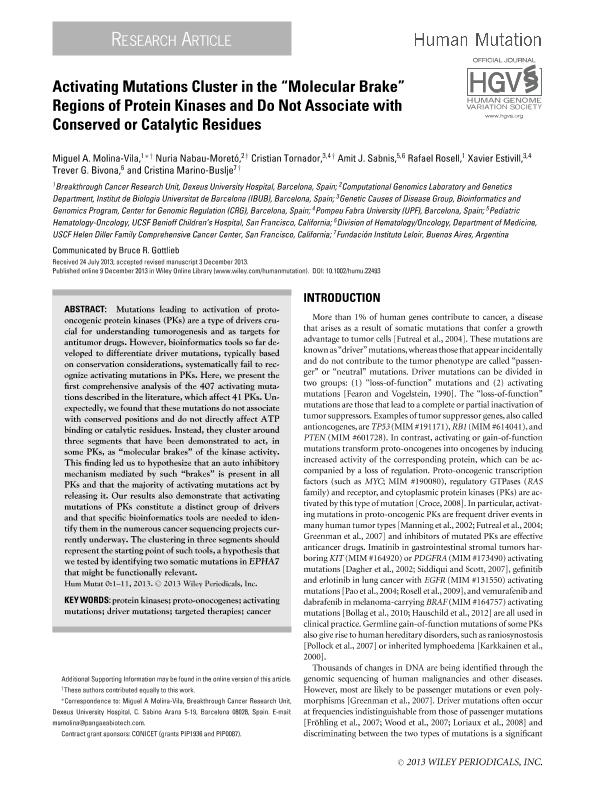Artículo
Activating Mutations Cluster in the “Molecular Brake” Regions of Protein Kinases and Do Not Associate with Conserved or Catalytic Residues
Molina Vila, Miguel A; Nabau Moretó, Nuria; Tornador, Cristian; Sabnis, Amit J; Rosell, Rafael; Estivill, Xavier; Bivona, Trever G; Marino, Cristina Ester

Fecha de publicación:
03/2014
Editorial:
Wiley
Revista:
Human Mutation
ISSN:
1059-7794
Idioma:
Inglés
Tipo de recurso:
Artículo publicado
Clasificación temática:
Resumen
Mutations leading to activation of proto-oncogenic protein kinases (PKs) are a type of drivers crucial for understanding tumorogenesis and as targets for antitumor drugs. However, bioinformatics tools so far developed to differentiate driver mutations, typically based on conservation considerations, systematically fail to recognize activating mutations in PKs. Here, we present the first comprehensive analysis of the 407 activating mutations described in the literature, which affect 41 PKs. Unexpectedly, we found that these mutations do not associate with conserved positions and do not directly affect ATP binding or catalytic residues. Instead, they cluster around three segments that have been demonstrated to act, in some PKs, as "molecular brakes" of the kinase activity. This finding led us to hypothesize that an auto inhibitory mechanism mediated by such "brakes" is present in all PKs and that the majority of activating mutations act by releasing it. Our results also demonstrate that activating mutations of PKs constitute a distinct group of drivers and that specific bioinformatics tools are needed to identify them in the numerous cancer sequencing projects currently underway. The clustering in three segments should represent the starting point of such tools, a hypothesis that we tested by identifying two somatic mutations in EPHA7 that might be functionally relevant.
Palabras clave:
Cancer
,
Activating Mutation
,
Driver Mutations
,
Prediction Tools
Archivos asociados
Licencia
Identificadores
Colecciones
Articulos(IIBBA)
Articulos de INST.DE INVEST.BIOQUIMICAS DE BS.AS(I)
Articulos de INST.DE INVEST.BIOQUIMICAS DE BS.AS(I)
Citación
Molina Vila, Miguel A; Nabau Moretó, Nuria; Tornador, Cristian; Sabnis, Amit J; Rosell, Rafael; et al.; Activating Mutations Cluster in the “Molecular Brake” Regions of Protein Kinases and Do Not Associate with Conserved or Catalytic Residues; Wiley; Human Mutation; 35; 3; 3-2014; 318-328
Compartir
Altmétricas



